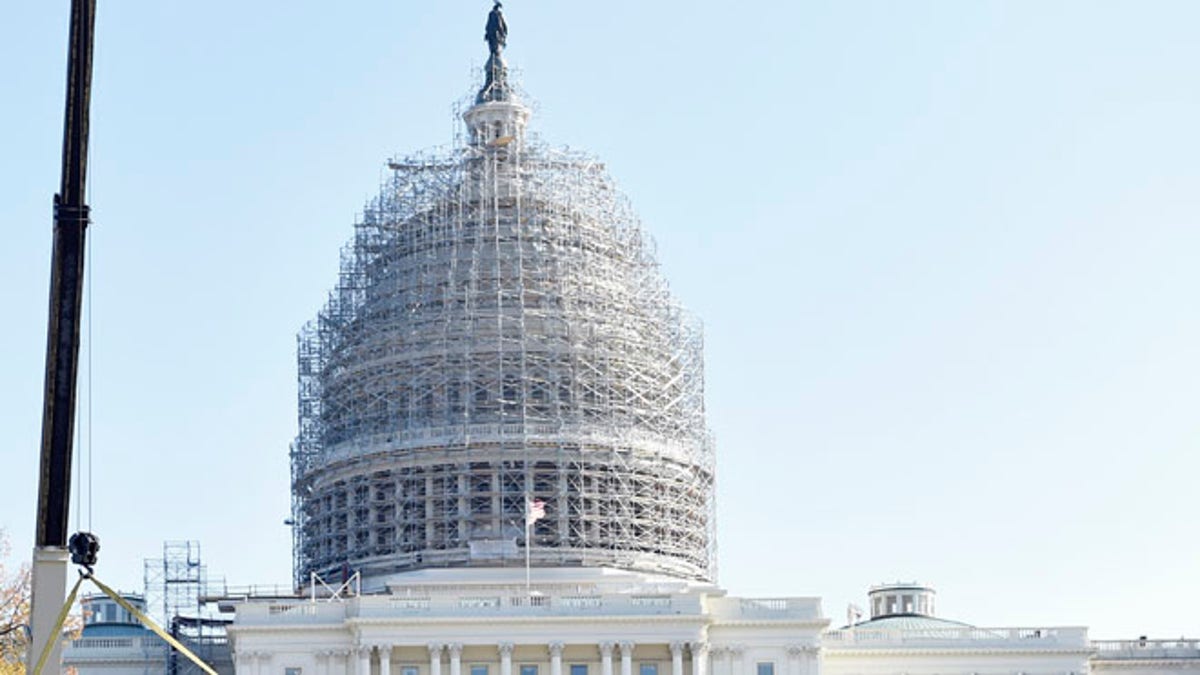
FILE: Nov. 21, 2014: U.S. Capitol, in Washington, D.C. (AP)
April of 2012? March of 2004? How about June of 2000?
Challenge anyone on Capitol Hill to recall what was going on during any of those timeframes and they probably can’t tell you.
But ask that same crew what was going down in any given December of any year and it’s like unlocking an historical floodgate.
1995: Various versions of government shutdowns.
1998: Bombing Iraq. Impeaching President Clinton. The end of Speaker-designate Bob Livingston, R-La. The selection of Speaker-in-waiting Dennis Hastert, R-Ill. They were all on the same Saturday right before Christmas, no less.
2000: Figuring out a power-sharing arrangement for a divided Senate.
2004: Approving the intelligence reform bill.
2005: A lengthy, failed attempt to OK drilling the Arctic National Wildlife Refuge.
2009: Voting on Christmas Eve on the first version of ObamaCare.
2010: A scrap over authorizing a bill to cover the medical costs of 9/11 first responders.
2011: A fight over renewing the payroll tax that came close to severing the Republican party.
2012: The “fiscal cliff.” This particular imbroglio entailed an epic recall of Congress to Washington between Christmas and New Year’s. It culminated with New Year’s Eve negotiations with Vice President Biden at the Capitol. The Senate launched post-midnight votes just after everyone rang in 2013.
You get the picture.
Everyone in Congress has a December to remember.
So it’s now mid-December. Congress is trying to wrap up its work for the year with several major issues outstanding. Capitol Hill inhabitants are hoping this all gets mopped up quickly. Maybe it’s more like April of 1997 or October of 2006.
What happened those years? No one recalls. That’s exactly how they all want this December to be: a month with no indelible legacy.
That remains to be seen. Congress must still fund the government, figure out a way to avoid major tax breaks from expiring at the end of the year and approve a massive plan to cover the health costs of 9/11 first responders (see 2010). The latter may be the easiest part. The former are more complex.
At one point earlier this week, House Speaker Paul Ryan, R-Wis., and Majority Leader Kevin McCarthy, R-Calif., informed lawmakers they should be prepared to hang around Washington for the weekend until all was complete.
By Thursday, everything changed. Nothing was ready. The Senate cut town Thursday afternoon. The House finished by midday Friday. McCarthy told members the House wouldn’t even meet on Monday and that no one was required to be back until 6:30 pm Tuesday.
“I thought we were closer to a bill than that,” House Minority Leader Nancy Pelosi, D-Calif., said shortly after McCarthy’s announcement.
That said, the new speaker -- who took the job on the condition he could spend weekends in Wisconsin with his family, hunting and watching the Green Bay Packers -- diligently remained in
Washington for part of the weekend to hash out details on the $1.1 trillion spending package to fund the government.
Ryan and his staff repeatedly noted they are tracking the omnibus bill and the tax package (often referred to as “tax extenders”) “side-by-side.”
It’s possible they could blend the bills into one. Moreover, there’s potential for horse-trading across the bills with no political firewall in between. In other words, the Democrats might score something they like in the omnibus whereas Republicans might snare a legislative priority in the tax package.
McCarthy asserted on Friday that he’d like to see the bills come to the floor separately. And in order to assert Democratic influence on the measures, Pelosi wants them decoupled. She noted that if the bills were tethered, she “wouldn’t recommend that anybody else vote for it. So that’s not a way to keep government open, unless they have all of the Republican votes to do it.”
In the past, Republicans have desperately needed Democratic support to avoid government shutdow.
When asked about cross-bill bartering, Pelosi was sure to sidestep this reporter’s question. Instead, she plunged headlong into an extended riff about basketball.
“Are you going to ask about the Warriors?” implored Pelosi, referring to the now-24-0 defending NBA champion Golden State Warriors. “When the Warriors are winning all of these games straight, he doesn’t want to ask about it.”
Never mind that the Warriors don’t even play in Pelosi’s San Francisco district, toiling across the bay in Oakland. However, the Warriors are slated to begin play in a few years in an arena planned for San Francisco’s Mission Bay neighborhood.
“We’re very proud of Stephen Curry,” added Pelosi of the NBA’s reining Most Valuable Player.
Does Curry’s on-court wizardly translate to negotiating spending packages?
The key issues in the omnibus are “riders,” extraneous policy provisions latched to the measure in order to coax lawmakers to vote yes -- or in some cases, no.
Fox is told that Republicans are skeptical of Pelosi’s push to tack a measure onto the spending bill to repeal the 19-year ban on federal gun research.
Democrats are also calling for calibrating a child tax credit to the rate of inflation, sometimes called “indexing.” Republicans advocate lifting the sale of domestic oil abroad. There is also GOP desire to add a conscience clause to allow for religious exemptions when it comes to abortions and health coverage.
The refugee issue remains sticky. It’s likely the legislation could result in some combination language that tightens up the visa waiver program and bolsters a review of Syrian and Iraqi refugees coming to the United States.
Pouring just the right legislative ingredients into both bills is the recipe to persuading a mix of Democrats and Republicans to vote yes. One general, pragmatic approach is that Democrats could vote for the omnibus while Republicans would support the tax plan.
Still, Ryan has a goal of having Republicans usher both plans to passage.
Former House Speaker John Boehner, R-Ohio, often cobbled together just enough Republican votes on a major bill, then then turned to Democrats for the remainder. Keep in mind that only
78 Republicans voted for the budget pact that Boehner negotiated before his departure. That legislation helped Ryan but also left him with the current state of affairs.
Ryan wants to avoid dipping into “John Boehner territory” if possible.
This is an effort to distinguish himself from his predecessor and demonstrate it’s a new day on Capitol Hill. Ryan wants the Republican majority to be responsible for approving big bills, not minority Democrats. House Majority Whip Steve Scalise, R-La., is clear of his goal of 150 Republican yeas on the omnibus. In reality, the GOP brass may be content with 124 Republicans (a majority of the majority).
Or…
“They want to get as many Republicans as possible so as not to embarrass Ryan,” said one knowledgeable source.
Republicans aim to post the text of the omnibus bill on Monday. They have an internal rule that requires a layover for parts of three days before the House may consider certain legislation.
This is so members can study and evaluate the bill. It also prevents the leadership from hastening the package to the floor. Boehner often took flak for an expedited approach. Again, Ryan wants to assert he’s not Boehner.
“We want to get it right,” Ryan said. “We don’t want to rush legislation, especially big legislation like this: omnibus appropriations.”
It’s a misnomer to interpret the “three-day” regulation as a “72 hour” or “three-day” rule. It’s really a “24-hour and two second rule.”
The GOP hopes to release the bill Monday and vote Wednesday. The stopgap bill the House and Senate approved late this week funds the government only through late Wednesday night. Even if the House moves with dispatch, it’s possible the Senate could take longer. That may entail yet another emergency spending measure to keep the federal lights on for a few days.
This is all if everything goes swimmingly. There is no guarantee the sides can settle on the riders and engineer the right balance to advance both bills. It’s also possible the House and Senate could pass a shorter-term tax bill which is ready.
Plus, the 9/11 health care bill could serve as a sweetener for either measure.
Few lawmakers want to vote against medical care for first responders.
It’s only mid-month. Things could still sour. Lawmakers would rather wrap this up as soon as possible.
Drama is bad this time of year. And everyone on Capitol Hill is hoping this month is rather forgettable and doesn’t wind up as an historic log entry, alongside other Decembers to remember.




